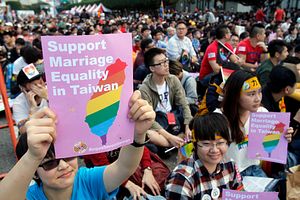To many LGBT rights supporters who have been fighting for marriage equality, Taiwan’s May 2017 Constitutional Court decision to recognize same-sex unions as a fundamental right was a victory decades in the making. The ruling gave Taiwanese authorities two years to amend marriage laws or pass new legislation to recognize this new reality. While the question of how this legislative change should look remains unsettled, opponents of same-sex marriage submitted plebiscite proposals and took the issue to the Taiwan High Court to overturn the Constitutional Court’s ruling. With political pressure building as the landmark decision reaches its one-year mark, what might the future bring for same-sex couples in Taiwan? Rather than leaving it up to a patchwork of referendums that would compromise legislation, Taiwan should simply amend the Civil Code to best serve the rights of same-sex couples.
Despite the May 2017 ruling, the same-sex marriage debate continues to divide Taiwanese society. A coalition of conservative and pro-status quo groups recently submitted referendum proposals to the Central Election Commission (CEC), the agency responsible for managing elections. Their proposals ask the Taiwanese public if they agree that marriage should be defined as union between a man and a woman and if they support protecting the rights of same-sex couples through alternative unions, instead of marriages. A “yes” vote on either of these would expressly contradict the decision of the Constitutional Court. Their argument is that the public, as opposed to the court, should be the final arbiter of this important issue.
The proposal followed the passage of recent amendments to Taiwan’s Referendum Act, which lowered the legal voting age and thresholds for initiating, seconding and passing referendums. Under the new law, the government will declare the referendum valid if 25 percent of all eligible voters cast ballots, and it will pass with a simple majority in favor of the proposal. These developments serve to stimulate public dialogue and participation in a wide range of issues, from minimum wage to the question of independence. However, the process of distilling complex, divisive issues—like same-sex marriage—into a simple “yes” or “no” is challenging and sensitive terrain. Furthermore, the CEC is expected to ensure that the referendum does not contain ambiguity that would confuse voters and undermine the spirit of a fair process.
As it stands, the referendums’ proposed language appears to offer a compromise: a vote to “protect” both the rights of same-sex couples and the definition of traditional marriage. A closer examination reveals that the ambiguity of the proposed civil unions or partnerships obscures an underlying denial of equal marriage rights as ruled by the Constitutional Court.
Questionable framing aside, these referendums also raise fundamental questions about the validity of plebiscites in tackling equal rights issues. First, should a minority group’s freedom of marriage, already confirmed by the court, be in the hands of a popular vote? Second, in the case of low voter turnout or close election results, how can legislators be sure this vote adequately represents the will of the people, especially such a complex and multifaceted issue? Furthermore, the CEC’s denial of LGBT activists’ request to participate in the referendum proposal hearing undermines the impartiality of the whole process.
Seeking consensus across party lines and balancing interests in society has proven challenging for the authorities, which have been grappling with the pros and cons of Civil Code amendments as opposed to an introduction of a new, special law. The Civil Code currently contains 498 provisions that stipulate the rights and benefits of legalized spouses, including social security, inheritance, tax and workers benefits. It is unclear what a special law would entail, and if the drafted legislation would allow same-sex couples to claim equal rights and benefits as those of heterosexual couples.
On one hand, anything less than equal rights would contravene the essence of the May 2017 ruling. On the other hand, if the special law promises the same rights and benefits for same-sex couples as those for heterosexual couples in the current Civil Code, how is this process any different than amending the Civil Code? The reason for passing a new legislation would be a political one because legislators have little incentive to bring about changes that would upset their constituencies in the run-up to local elections this November. In this political climate, an introduction of a separate, special law would seem like a consensus-based, middle ground solution.
Almost a year following a landmark ruling on the subject, the fight for marriage equality is far from over. In the spirit of the May 2017 ruling, Taiwan should ensure equal marriage rights to same-sex couples by amending the Civil Code. Its success will reaffirm that human rights, marriage equality and traditional values can coexist in Taiwan and stand as an example to other Asian countries seeking to respect this basic human right.
Zoe Leung is the Senior Program Associate of the EastWest Institute’s Asia-Pacific Program. A native of Hong Kong, Leung has studied in Taiwan, London, Tokyo, Beijing and the U.S. She tweets @daarcheeni

































